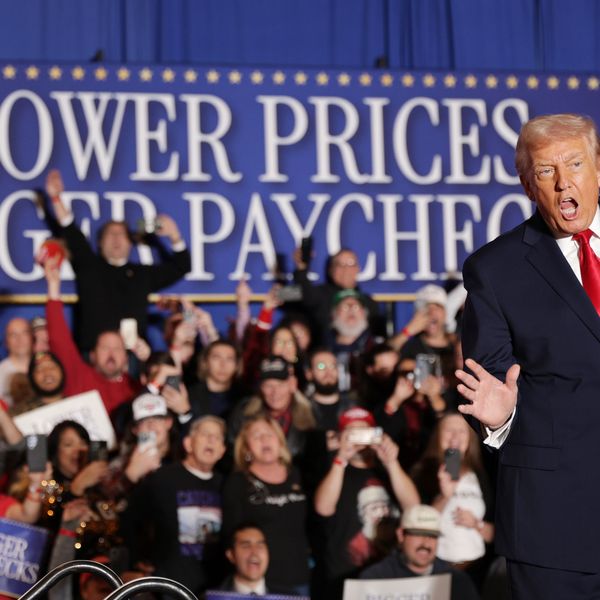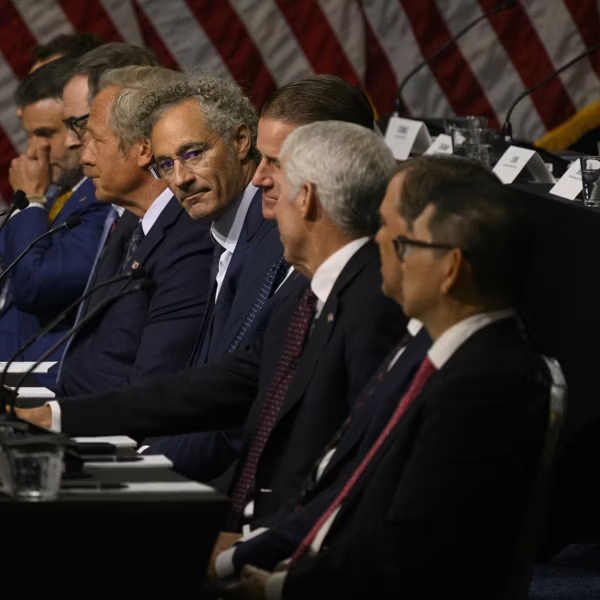Trump's Administration Poised to Be Wealthiest in Modern US History
Wilbur Ross, commerce secretary nominee, has 10 times as much wealth as previous richest administration, under George W. Bush, combined
Despite his populist appeals, President-elect Donald Trump is putting together the wealthiest administration in modern U.S. history, the Washington Post reported on Wednesday.
The collective wealth of Trump's appointees is astronomically larger than the previous richest cabinet under George W. Bush, whose administration had an "inflation-adjusted net worth" of about $250 million combined, as the Post's Jim Tankersley and Ana Swanson point out. Trump's nominee for commerce secretary, Wilbur Ross, has roughly 10 times that wealth alone.
In addition to Ross, who is worth about $2.5 billion, Trump's nominee for education secretary, Amway heiress Betsy DeVos, has a family net worth of $5.1 billion.
Todd Rickets, the nominee for deputy secretary of commerce, is the son of a billionaire and co-owns the Chicago Cubs.
Elaine Chao, transportation secretary appointee and wife of Senate Majority Leader Mitch McConnell (R-Ky.), is the daughter of a shipping and trading tycoon. In 2014, following several generous gifts from the Chao family, McConnell's personal wealth stood at $22.8 million.
Steven Mnuchin, Trump's pick for head of the Treasury Department, is a former Goldman Sachs executive and Hollywood producer whose net worth is estimated at $40 million, much of it accrued while working in the financial industry--including profiting off the financial crisis.
As Sen. Elizabeth Warren (D-Mass.) noted on Twitter, Mnuchin "would get to decide how to regulate 30 of our biggest banks--including the bank where he currently serves as board member."
Tankersley and Swanson continue:
Future appointments could further increase the wealth of Trump's cabinet. Harold Hamm--a self-made oil industry executive who ranks 30th on the Forbes 400, a list of the wealthiest Americans, with a net worth of $16.7 billion,--is on Trump's shortlist for secretary of energy. Andrew Puzder, a restaurant industry executive, has been floated for labor secretary.
"It's important to recognize that everyone's perspective and policy and government is shaped by the kind of life you've lived," Nicholas Carnes, a political scientist at Duke University, told the Post. "The research really says that when you put a bunch of millionaires in charge, you can expect public policy that helps millionaires at the expense of everybody else."
On the campaign trail, Trump decried a political system he said was rigged against the working class and made a now-infamous promise to "drain the swamp" of establishment figures. But his cabinet picks thus far contradict his populist rhetoric and have garnered widespread criticism from other lawmakers, as well as public policy and government watchdog groups.
As Robert Weissman, president of Public Citizen, said after the election, "Candidate Trump ran against the establishment. President-Elect Trump has handed over the keys to his administration to the establishment."
An Urgent Message From Our Co-Founder
Dear Common Dreams reader, The U.S. is on a fast track to authoritarianism like nothing I've ever seen. Meanwhile, corporate news outlets are utterly capitulating to Trump, twisting their coverage to avoid drawing his ire while lining up to stuff cash in his pockets. That's why I believe that Common Dreams is doing the best and most consequential reporting that we've ever done. Our small but mighty team is a progressive reporting powerhouse, covering the news every day that the corporate media never will. Our mission has always been simple: To inform. To inspire. And to ignite change for the common good. Now here's the key piece that I want all our readers to understand: None of this would be possible without your financial support. That's not just some fundraising cliche. It's the absolute and literal truth. We don't accept corporate advertising and never will. We don't have a paywall because we don't think people should be blocked from critical news based on their ability to pay. Everything we do is funded by the donations of readers like you. Will you donate now to help power the nonprofit, independent reporting of Common Dreams? Thank you for being a vital member of our community. Together, we can keep independent journalism alive when it’s needed most. - Craig Brown, Co-founder |
Despite his populist appeals, President-elect Donald Trump is putting together the wealthiest administration in modern U.S. history, the Washington Post reported on Wednesday.
The collective wealth of Trump's appointees is astronomically larger than the previous richest cabinet under George W. Bush, whose administration had an "inflation-adjusted net worth" of about $250 million combined, as the Post's Jim Tankersley and Ana Swanson point out. Trump's nominee for commerce secretary, Wilbur Ross, has roughly 10 times that wealth alone.
In addition to Ross, who is worth about $2.5 billion, Trump's nominee for education secretary, Amway heiress Betsy DeVos, has a family net worth of $5.1 billion.
Todd Rickets, the nominee for deputy secretary of commerce, is the son of a billionaire and co-owns the Chicago Cubs.
Elaine Chao, transportation secretary appointee and wife of Senate Majority Leader Mitch McConnell (R-Ky.), is the daughter of a shipping and trading tycoon. In 2014, following several generous gifts from the Chao family, McConnell's personal wealth stood at $22.8 million.
Steven Mnuchin, Trump's pick for head of the Treasury Department, is a former Goldman Sachs executive and Hollywood producer whose net worth is estimated at $40 million, much of it accrued while working in the financial industry--including profiting off the financial crisis.
As Sen. Elizabeth Warren (D-Mass.) noted on Twitter, Mnuchin "would get to decide how to regulate 30 of our biggest banks--including the bank where he currently serves as board member."
Tankersley and Swanson continue:
Future appointments could further increase the wealth of Trump's cabinet. Harold Hamm--a self-made oil industry executive who ranks 30th on the Forbes 400, a list of the wealthiest Americans, with a net worth of $16.7 billion,--is on Trump's shortlist for secretary of energy. Andrew Puzder, a restaurant industry executive, has been floated for labor secretary.
"It's important to recognize that everyone's perspective and policy and government is shaped by the kind of life you've lived," Nicholas Carnes, a political scientist at Duke University, told the Post. "The research really says that when you put a bunch of millionaires in charge, you can expect public policy that helps millionaires at the expense of everybody else."
On the campaign trail, Trump decried a political system he said was rigged against the working class and made a now-infamous promise to "drain the swamp" of establishment figures. But his cabinet picks thus far contradict his populist rhetoric and have garnered widespread criticism from other lawmakers, as well as public policy and government watchdog groups.
As Robert Weissman, president of Public Citizen, said after the election, "Candidate Trump ran against the establishment. President-Elect Trump has handed over the keys to his administration to the establishment."
Despite his populist appeals, President-elect Donald Trump is putting together the wealthiest administration in modern U.S. history, the Washington Post reported on Wednesday.
The collective wealth of Trump's appointees is astronomically larger than the previous richest cabinet under George W. Bush, whose administration had an "inflation-adjusted net worth" of about $250 million combined, as the Post's Jim Tankersley and Ana Swanson point out. Trump's nominee for commerce secretary, Wilbur Ross, has roughly 10 times that wealth alone.
In addition to Ross, who is worth about $2.5 billion, Trump's nominee for education secretary, Amway heiress Betsy DeVos, has a family net worth of $5.1 billion.
Todd Rickets, the nominee for deputy secretary of commerce, is the son of a billionaire and co-owns the Chicago Cubs.
Elaine Chao, transportation secretary appointee and wife of Senate Majority Leader Mitch McConnell (R-Ky.), is the daughter of a shipping and trading tycoon. In 2014, following several generous gifts from the Chao family, McConnell's personal wealth stood at $22.8 million.
Steven Mnuchin, Trump's pick for head of the Treasury Department, is a former Goldman Sachs executive and Hollywood producer whose net worth is estimated at $40 million, much of it accrued while working in the financial industry--including profiting off the financial crisis.
As Sen. Elizabeth Warren (D-Mass.) noted on Twitter, Mnuchin "would get to decide how to regulate 30 of our biggest banks--including the bank where he currently serves as board member."
Tankersley and Swanson continue:
Future appointments could further increase the wealth of Trump's cabinet. Harold Hamm--a self-made oil industry executive who ranks 30th on the Forbes 400, a list of the wealthiest Americans, with a net worth of $16.7 billion,--is on Trump's shortlist for secretary of energy. Andrew Puzder, a restaurant industry executive, has been floated for labor secretary.
"It's important to recognize that everyone's perspective and policy and government is shaped by the kind of life you've lived," Nicholas Carnes, a political scientist at Duke University, told the Post. "The research really says that when you put a bunch of millionaires in charge, you can expect public policy that helps millionaires at the expense of everybody else."
On the campaign trail, Trump decried a political system he said was rigged against the working class and made a now-infamous promise to "drain the swamp" of establishment figures. But his cabinet picks thus far contradict his populist rhetoric and have garnered widespread criticism from other lawmakers, as well as public policy and government watchdog groups.
As Robert Weissman, president of Public Citizen, said after the election, "Candidate Trump ran against the establishment. President-Elect Trump has handed over the keys to his administration to the establishment."

